Part 2
Carrying on from Part 1 on ‘how to keep your heart healthy’ we will go through the whole process of how cardiovascular disease can happen to a seemingly healthy person.
 Stress is the start
Stress is the start
We know that stress is the biggest depleter of magnesium. All kinds of stress, be it physical, mental, heat, cold, bereavement, divorce, disease, toothache, workouts, marathons, kids, work, money. You name it, we get stressed from it. It cannot be avoided and we have to live with it. We go from day to day, not realising the kind of stress we are under. We don’t even know we’re stressed because it’s part of everyday life.
Our bodies on the other hand, have to deal with it and if we have a plentiful supply of magnesium, our bodies will be better able to cope with all the stresses life throws at us.
What happens without enough magnesium?

Magnesium has many jobs within our bodies. As it’s necessary for all our cells, if it’s missing or low, we will start to suffer the consequences.¹ Apart from ATP, our energy currency, which was covered in Part 1, magnesium has another vital job and that is to regulate calcium. If these two electrolytes are not in balance and its nearly always high calcium to low magnesium, then a wide range of health problems will ensue, most importantly cardiovascular disease.²
Magnesium’s ‘gatekeeper’ role
Magnesium controls how calcium is used in our cells. Its a sort of cell gatekeeper making sure that calcium goes into the cell when needed and ushered out of the cell when not. Magnesium ion concentrations inside cells are around 10,000 times that of calcium ions. If, for any reason, magnesium levels in cells fall, calcium ions will flood the cells causing cell excitation and hyperactivity.
This reaction is occasionally wanted during the fight-flight response where extra power for strong contraction of muscles is required. The fight-flight response would not happen without calcium flooding into the cells. Stress causes this same reaction which is one reason why we can deplete our reserves of magnesium so easily. The more stress, the more fuel needed and the more magnesium necessary to enable production of that fuel.

Under normal conditions though, you do not want excess muscle contractions. It will cause severe muscle pain through cramping up and this can adversely affect the heart. To relax, muscles need magnesium. If calcium levels increase too much within a cell, the cell changes physically. Calcium will start to calcify, undermining the cell. As more cells are affected, this calcification starts to hamper the proper function of the cardiovascular system.³
Calcium channel blocker
This blocking of calcium from the cells is often done with drugs, with ‘calcium channel blockers’ commonly used for patients with high blood pressure. You may ask why doctors don’t use magnesium, the natural calcium channel blocker. It’s a question I ponder over many times. Magnesium has been proven to reduce blood pressure. The thing is with magnesium, blood pressure will be reduced until it’s at the optimum level and then it will stabilize. Unlike drugs which have to be carefully controlled to make sure the drug doesn’t over perform and reduce blood pressure beyond the optimum.
Magnesium keeps calcium dissolved in the blood
As well as it’s gatekeeper role, magnesium also controls calcium by activating hormones that govern calcium levels and calcium locations within the body. Without enough magnesium, calcium is out of control and able to migrate to parts of the body where it shouldn’t be. Magnesium keeps calcium dissolved in the blood. Without it, calcium will thicken the blood, migrate and/or calcify. Think of kidney stones, arthritis, osteoporosis and calcification in the brain, in breast tissue and in arteries, exacerbating the accumulation of plaque buildup and then calcifying that plaque.
This is the missing link
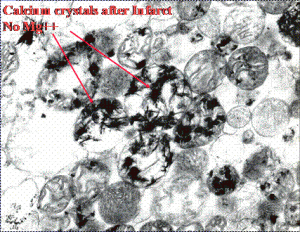
So here we are with too much calcium swilling around the body with a deficiency of magnesium unable to control it. Already the calcium is creating havoc by calcifying in various places not least within the cardiovascular system. This in turn, starts to deteriorate the cells and they start to die. The resulting loss of energy levels because ATP in the dying cells cease production, slowly undermines the energy output to the heart. At the same time, endothelium cells which line and keep the arteries smooth, are breaking down because of cell death from calcification. The damage induces the immune response which in turn produces more plaque to be hardened by the rogue calcium and so the cascade continues.
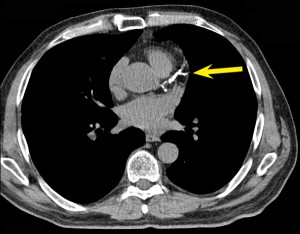
As this process spirals out of control, the cells of the heart will continue to calcify and die until the heart can’t function any more. It has been starved of energy until it ceases to pump. It has, in effect, run out of fuel. The depletion of magnesium has caused all this devastation. Just one simple essential mineral, needed to produce energy through Mg-ATP and at the same time control calcium. It’s a double whammy. Magnesium deficiency undermines the integrity of the cardiovascular system from the cellular level up.
The devastating process in a nutshell
So here we have it in a nutshell – Stress depletes magnesium, Mg-ATP declines, heart and arteries lose energy, calcium takes over cells, cells calcify and die, inflammation sets in, energy loss and magnesium depletion causes more cell death and inflammation and the vicious circle continues until the heart can’t carry on any more. The body cannot heal itself because it hasn’t got the energy or the control to do so.
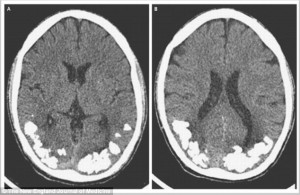
Think of this process going on within the brain or the central nervous system. The kidneys, breast tissue, the bladder, the myelin sheaths, the carotid arteries. Anywhere there are cells, there can be cell death due to excess calcium and depleted magnesium. This is why so many diseases and conditions are centred around a magnesium deficiency. If you keep your body replete in magnesium at all times, if you make sure your calcium intake ratio is optimally 1:1 but never more than 2:1 calcium to magnesium. These simple rules will ensure you will avoid cardiovascular and the other multitude of diseases which are caused by magnesium deficiency.
It’s up to you. Supplementation of magnesium is cheap and effective. No need to supplement with calcium, you will be taking enough through your diet of dairy produce. If you’re lactose intolerant and not drinking milk or eating dairy produce, you may need to supplement with calcium but even that I doubt because of the many foods that contain or are fortified with calcium.
Foods fortified with calcium
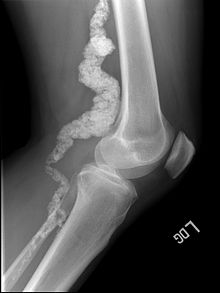
In the UK the Bread and Flour Regulations of 1998 and amended in 2008, deemed that calcium carbonate which is chalk, has to be in all bread and flour made from wheat. This is the law! The Regulations require that, subject to certain exceptions, four specific nutrients in specified quantities must be added to all wheat flour, whether or not mixed with other flour. They are:
- Iron
- Thiamin (Vitamin B1),
- Nicotinic acid or nicotinamide
- Calcium carbonate
Apart from bread, other foods fortified with chalk are breakfast cereals, breakfast bars, soy milk, almond milk, orange juice, a plethera of baked goods, cakes and biscuits etc.. The list is endless. It’s interesting to note that before the 1998 law came out, calcium carbonate in bread was called an ‘adulterant’. Now it’s called ‘fortification’!
You can see that it is highly unlikely that you will be deficient in calcium even if you are lactose intolerant. I drink milk in my tea. Being a tea addict, I consume approximately a pint of milk per day. Just this milk alone, gives me more than my RDA of 500mg of calcium which is the World Heath Organisation recommendation (WHO).
Keeping these two important nutrient metals in balance, is all you need to start living a healthier life. The first thing you will notice when you start eating magnesium rich foods and/or taking a magnesium supplement, is the extra energy you will have. Go for it. Keep your heart healthy and at the same time keep your whole body in good condition.
 I’d love to read your comments on this serious subject. Any input would be greatly appreciated and I always reply.
I’d love to read your comments on this serious subject. Any input would be greatly appreciated and I always reply.
- Liao F1, Folsom AR, Brancati FL. Is low magnesium concentration a risk factor for coronary heart disease? The Atherosclerosis Risk in Communities (ARIC) Study. Am Heart J. 1998 Sep;136(3):480-90.
- Rosanoff A, Rising Ca:Mg intake ratio from food in USA Adults: a concern? Magnes Res. 2010 Dec;23(4):S181-93. doi: 10.1684/mrh.2010.0221. Epub 2011 Jan 14
- Serum magnesium is inversely associated with coronary artery calcification in the Genetics of Atherosclerotic Disease (GEA) study Rosalinda Posadas-Sánchez, et al Nutrition Journal201615:22 DOI: 10.1186/s12937-016-0143-3© Posadas-Sánchez et al. 2016
Spread the word!

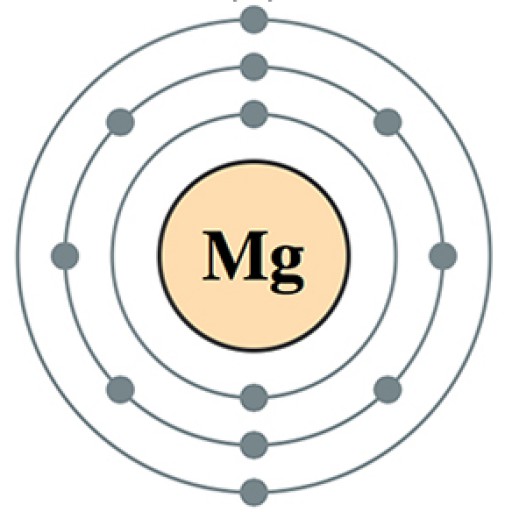
Great article, especially for someone like me! About 5 months ago I was diagnosed with a misfiring heart of sorts and ended up on Beta Blockers.
I’ve had to change loads of things around in my life by I still slip into old habits. It’s as simple as replacing beer with red wine – but it still feels harder than it should at times. I was recommended dates – how do you think these fair as a heart healthy fruit/food?
Hi there Chris and thanks for the comment and reading the article. I’m sorry to learn you have a heart problem but you can do no better than to start taking a Magnesium (Mg) supplement. Mg Chloride solution is 100% bioavailable and it will go straight into the blood stream, see Best Magnesium Supplements To Take Mg Citrate powder is my second favourite, especially if you need a little help with constipation which is a common problem with Mg deficiency. Don’t buy Mg oxide, it’ll go straight through you with only up to 4% availability, that’s why it’s the cheapest form.
Don’t consume too much Calcium (Ca) and that includes antacids. So much of our food is fortified with Ca that we often don’t know how much we’re consuming. Try and aim for a ratio of 1:1 Mg:Ca, which is difficult to do, that’s why so many of us are Mg deficient. An overload of Ca will make you Mg deficient by default! It can also cause arrhythmias so your condition could be exacerbated with too much of it. As for Mg rich foods, dates are great at 43mg per 100g. Almonds give you 268mg of Mg per 100g but they do have 264mg of Ca in them! All seafood has some Mg in it. Leafy green veggies are good too.
It would be great if you could get off the beta blockers and keep with a good quality Mg supplement which will do you a power of good. If your ‘misfiring heart’ is actually A-Fib, the ablation is a very successful procedure now. Good luck, Ches
I never realized all the roles magnesium plays in our bodies or the importance of balance when it comes to the calcium/magnesium ratio. It is great that you stress that this is the missing link to heart disease. Magnesium is cheap and effective as you point out so a daily dose of magnesium is a no brainer. Thanks for opening my eyes to these very important facts!
Hi there Ryan and thanks for reading the post. I’m pleased you’ve found value in the content and hopefully you will now be a healthier person with this knowledge. Please spread the word to your family and friends. Knowledge is power and with respect to magnesium the protection is gives against serious disease is profound. Ches
So much great information here, it’s awesome! I’ve known for a while now that magnesium is important and I try very hard to get lots of magnesium into my diet.
Along with making sure I include it in my diets, I also like to dissolve some epsom salts into a bath once a week. I’ve heard Magnesium hits your system faster and even better when it’s absorbed rather than ingested.
Anyway, I’ve done some research before but this definitely added to my knowledge of magnesium! Thank you!
Hi Steph and thanks for reading the post. You’re right about topically applying magnesium, it gets into the body fast and as it doesn’t go through the digestive system, there’s no laxative effect. I’m really pleased that you are aware of the importance of keeping up magnesium levels. Please spread the word and inform your friends and family of how vital it is. Ches
Hi Chessie
Wow!!!This is probably one of the most important articles that I have read. It’s a wake up call.
Stress, is bad but I think what is worse is not doing something about it, before its too late,especially if it means to prevent heart attacks.
I am definitely going to start with Mg supplementation.
What would you say is the optimum amount of Magnesium that one should take in on a daily basis to prevent these attacks?
Are there any side effects associated with taking Mg supplements.
Thanks for the post, I will be sharing it with my friends on G+ to get the word out there.
Regards
Roopesh
Hi Roopesh and thanks for reading the article and actually wanting to act upon it! This is very gratifying to me as spreading the word is my only reason for this site. First, I suggest you have a look at this page Best Magnesium Supplements which will give you all the different types of magnesium salts that are generally available.
Depending on your diet, you will need at least 300-400mg of magnesium per day. If you eat plenty of nuts and seeds, oily fish, green vegetables and wholemeal bread, you will take in a good amount of magnesium with your food. A hundred years ago though, we would all be ingesting much more magnesium because of our fertile soils. Now farming practices have changed and the land is depleted of much of its nutrients, particularly magnesium. If you’re in a hard water area, you will hopefully gain some magnesium from your drinking water. Keeping the calcium to magnesium ratio at 1:1 is the trick and it’s a difficult task with just food. My husband who weighs 150 lbs, takes 450mg of magnesium chloride which is taken in water. Carolyne Dean MD does a good quality one called ReMag. I have another type on my site called Ionic Magnesium. Magnesium citrate is another good supplement but it is a little laxative which is ideal if you suffer with constipation, a very common symptom of magnesium deficiency. Don’t buy magnesium oxide. It is widely available and is cheap to produce but it is only 4% bioavailable. Whichever one you choose, take it slowly and work up to your optimum dose which is different for everyone. Magnesium chloride IMHO is the best and I take 600mg per day. Try to watch your calcium intake and keep it no more than 2:1 – ca:mg but aim for 1:1. If you take a little more magnesium than calcium that’s fine. Thank you so much for sharing. This alkaline metal is vital for our health and will protect us from serious disease. Good health to you and yours always. Ches
I take magnesium for migraines not heart health, although I’m sure my dad does, seeing as how he’s had two bypass surgeries. Something you may want to add to your information is to slowly build up your magnesium tolerance because it can cause diarrhea, so I can only take so much each day before I start feeling the results. Just something to think about. It’s not a bad to take it’s just a side effect that can happen in some people and you might want to warn them.
Hi there and thanks for reading the article. You’re right about going slow and that goes for any new supplement. Some magnesium salts are more laxative than others for instance magnesium chloride is well tolerated as it’s completely bioavailable and not much goes through the digestive system. With magnesium oxide, the cheapest and least effective form, a laxative effect will be evident. Magnesium citrate is a little laxative but usually well tolerated by most. I have a page Best Magnesium Supplements which gives most of the salts available and their effects, perhaps I’ll add it to the post. Good health to you and yours, Ches
What a wonderful piece of writing on a subject that matters to all of us.
Heart trouble as been a trait in my family past losing both my father and grandfather to to heart problems.
The main problem is you do not realize something is not right until it is too late.
Stress is a really big problem and my father was always stressed, sometimes for the smallest of things.
This post serves as a great reminder of how important the heart is and the requirement to look after yourself.
Thanks so much!
Chris
Thank you Chris for reading the post. I sincerely hope you’re looking after yourself and ensuring your family trait of heart problems stops now and you live a happy and healthy life! Stress is the start and knowing you’re under stress or will be at specific times, allows you to up your levels of magnesium to alleviate any imminent depletion. Thanks for the positive comments and good health to you always. Ches